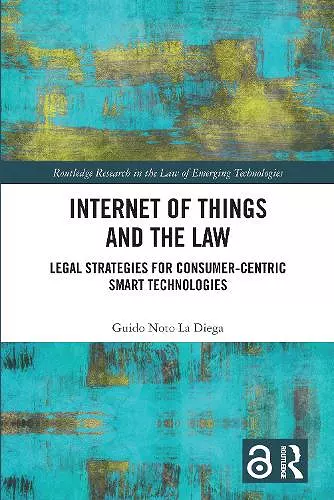Internet of Things and the Law
Legal Strategies for Consumer-Centric Smart Technologies
Format:Hardback
Publisher:Taylor & Francis Ltd
Published:14th Oct '22
Currently unavailable, and unfortunately no date known when it will be back

This insightful book examines the legal implications of the Internet of Things, exploring how existing laws can adapt to modern technological challenges.
This book provides a thorough analysis of the legal challenges associated with the regulation and governance of the Internet of Things (IoT). It delves into how laws originally designed for offline technologies can adapt to the rapid digitalization and expansion of internet technologies. The author, Noto La Diega, examines the implications of dematerialization and digitalization, while also addressing the emerging trend of rematerialization, which focuses on the return of data, knowledge, and power within a physical, 'smart' world.
Internet of Things and the Law stands out as one of the most comprehensive and current examinations of the legal issues surrounding the IoT. The book poses a pivotal question: can the law guide rematerialization in a manner that is human-centric and socially equitable? Through an in-depth analysis, it explores how existing laws can be interpreted to empower end users of IoT technologies. The discussion highlights the challenges faced when legal frameworks struggle to keep pace with technological advancements.
In its conclusion, the book raises critical questions about the failures of the law and encourages a collective resistance against the forces of 'smart' capitalism. By presenting these ideas, Internet of Things and the Law serves as a crucial resource for legal scholars, policymakers, and anyone interested in the intersection of technology and law. The Open Access version of this book is available under a Creative Commons Attribution (CC-BY) 4.0 license.
‘Internet of Things and the Law is an impressive work on several levels. It exposes inadequate consumer safeguards in the current “contractual quagmire” and complex, overlapping regulatory regimes governing the IOT. Noto La Diega masterfully analyzes the relevant privacy, intellectual property, telecommunications, competition, and internet laws as he explicates their implications and proposes reforms. But like an artist sweeping away an intricate mandala after he has completed it, Noto La Diega boldly recognizes the limits of law and proposes a utopian horizon for IOT governance based on a deep engagement with studies in political economy and social theory. This book not only advances our understanding of IOT policy but also serves as a model for future work in the law and political economy of technology policy.’
Professor Frank Pasquale , Brooklyn Law School, author of the bestseller The Black Box Society
‘ Internet of Things and the Law: Legal Strategies for Consumer-Centric Smart Technologies is a thorough exposition of the regulation of the Internet of Things which starts by expertly defining ‘the Things’ and the regulatory puzzles around them. Keeping the consumer front and centre, the book engages with a broad range of issues starting with ‘Netflix Law, GeoBlocking and the personal/nonpersonal data binary. A strong case is made for a non-binary approach to regulation and for legal approaches, including contract law, consumer law, privacy law and intellectual property law, that mitigate the imbalances and vulnerabilities consumers are exposed to. Ultimately, Nota La Diega argues that the Commons for a Collectivised and Open IoT will take society beyond the limitations of these legal approaches. This is a timely and brilliant addition to scholarship that should inform forward-thinking regulatory approaches.’
Professor Caroline B Ncube , Professor and SARChI Research Chair in Intellectual Property, Innovation and Development, University of Cape Town
‘A wonderfully informative and deeply reflective study of the Internet of Things from a socio-legal perspective, presented to us by one of the leading experts in the field. Dr Guido Noto La Diega convincingly argues for an open IoT and points to some hopeful signs. The book should be read especially by those interested in how European law might effectively regulate an Internet dominated by ‘Things’ and how people acting collectively can harness their power to reshape the future.’
Professor Megan Richardson, Professor of Law, University of Melbourne, and Chief Investigator in the ARC Centre of Excellence for Automated Decision-Making and Society
‘The only comprehensive and thorough legal analysis of IoT available as yet, which beautifully combines technological savvy with an admirable love for polemics’
Professor Marco Ricolfi , Co-Director of the Nexa Centre for Internet & Society; Professor of Commercial Law, Università degli Studi di Torino; Equity Partner at Weigmann Studio Legale
ISBN: 9781138604797
Dimensions: unknown
Weight: 1020g
378 pages